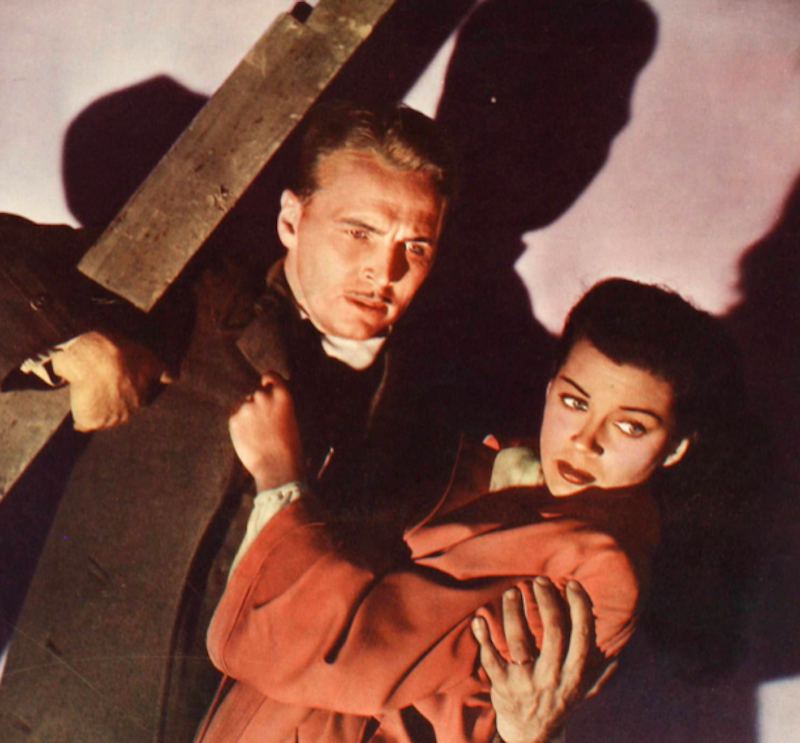Edward G. Robinson had a gift at bringing out authenticity and reality in his acting. No matter what role he played—a gangster, a detective, an insurance claims officer—Robinson made you believe it. In John Farrow’s Night Has a Thousand Eyes (1948), Robinson creates an earthly reality out of the supernatural phenomena.
Robinson plays John Triton, a trickster with a magic act, claiming to be a clairvoyant. Part of the act are also his friends and partners, Jenny and Whitney. Business is going well, and money is steadily coming in. John’s at the center of the act, and during each performance, he “magically” tells unsuspecting strangers in the audience they’ll get that job they’re searching for, that love will find them, that those beyond the grave are still with them, and similar, logically conclusive, events.
But something changes during one of the performances. In the midst of fakery and magic, John suddenly stops, staring into the distance. He singles out a couple in the audience, and tells them to go home immediately because their son’s in great danger. Both Jenny and Whitney are confused: clearly, this isn’t part of the act. John isn’t exactly clear on it either; it was as if he was possessed by some supernatural force, something he can’t explain.
It turns out that John was right: his strange prophecy came true. This would mark the beginning of darkness and existential fatigue for John. Everything came crumbling down when he received a vision that Jenny would die in childbirth. In order to supposedly save her from this fate, John leaves her and Whitney. He should’ve known better that you can’t escape destiny. Despite the fact that he left Jenny unannounced, she still dies in childbirth, except the father of the child is Whitney.
No matter how hard he tried, John couldn’t save Jenny. The child that was born is Jean Courtland, now a grown woman on the verge of getting married, and, it would appear, on the verge of dying. At least, that is what John thinks. He has learned to trust his visions, even if he’s elected and tried his best to stay away from human contact as possible. The rest of the film becomes a race against Jean’s death.
In his autobiography, All My Yesterdays (written with Leonard Spigelgass), Robinson described Night Has a Thousand Eyes as “unadulterated hokum that I did for the money.” This may be a harsh judgment on Robinson’s part. The film indulges in a bit of “hokum” and gimmicks from a storytelling perspective, but not to the extent that renders the film pointless or without an aesthetic value. After all, it was directed by John Farrow, and wonderfully photographed by John Seitz, whose other work includes Double Indemnity (1944), The Lost Weekend (1945), and Sunset Boulevard (1950).
Farrow and Seitz use all of the film noir techniques to bring out the horror or gothic aspect of the film. It’s Robinson’s performance that stands out and adds immense aesthetic maturity and depth. There’s also a great shot of Los Angeles funicular railway, Angels Flight, a sight that’s seen by John Triton every day from his one-room apartment. He’s living above everything not because he feels more important than others but the opposite: he aims to be a forgotten man. Death seems like the best cure for his condition. He knows the truth of what’s to come but rarely can do anything about it. This only brings despondency and fatigue to his already worn-out face.
Robinson navigates from a paid magician to a broken man, haunted by his visions, in such a way that it’s easy to believe in the supernatural. Yet, there’s a constant doubt throughout the film. Is John Triton real? Is his so-called gift real, or is he simply a swindler, going after Jean’s money (as her fiancé alluded to at the beginning of the film)?
Night Has a Thousand Eyes doesn’t fit neatly into the film noir category, yet it contains the same existential anxiety and anguish that we see in the films around the same time. The notion of the supernatural is a vehicle through which post-war anxieties can still be felt. If the film was meant to provide escapist pleasure, then it most likely succeeded but the consciousness of the film itself can’t evade the reality of post-war America. It’s in this that the film gains power, something Robinson or others involved in the film couldn’t have foreseen.

